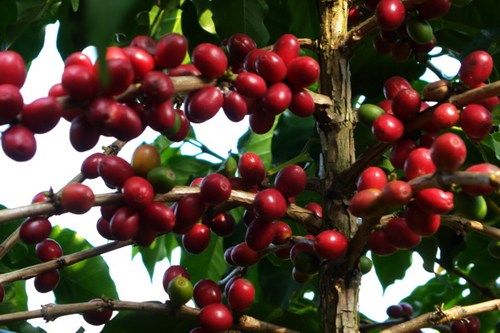
(Ecns.cn) – For at least 2,000 years families have cultivated tea in the rolling hills of Pu'er in southwest China's Yunnan Province, yet in recent years the prefecture-level city has shifted its focus to become one of the most important coffee growing areas in the world. Last year, about 60 percent of the 40,000 tons of coffee produced in China came from Pu'er.
In 2007, the city changed its name from Simao back to its historical name of Pu'er in an effort to capitalize on the reputation of the tea leaves it had made famous. However, after the severe economic distress caused by a major downturn in the price of tea the following year, coffee production became a new source of revenue for local farmers.
At the end of 2011, the Pu'er government formally proposed that it would build the city into China's coffee capital, with coffee plantations extending to 67,000 hectares (165,561 acres) by 2015.
New identity
Jin Jihui, a knowledgeable young man who embraces an artistic and spiritual way of life, moved to Pu'er to enter the tea business in 2007, but soon found that the tracts of coffee plantations lining the roads could satisfy his desire to open a cafe there instead, noted the Southern Metropolis Weekly.
For many years, Jin had dreamed of making coffee with self-produced beans in his own cafe. Now, he is a contractor of a 200-hectare coffee plantation and is making preparations to make his dream come true.
In 2010, Alex, a barista at a Hong Kong-based café, flew to Yunnan on a mission to set up a chain store in Kunming after hearing that Pu'er produces very good coffee.
Now Alex works day in and day out at a cafe located in Kunming's glitziest downtown area, which is always full of customers till late at night. Alex says he likes his life there, and is happy that the cafe has become welcomed by so many people.
In October 2011, the size of Pu'er's coffee plantations reached more than 28,300 hectares, about 66 percent of the total in Yunnan Province. Currently, the size is already one-third that of the tea leaf plantations in the city, according to the Southern Metropolis Weekly.
Economic impetus
Not surprisingly, all of the top five coffee suppliers in the world, including Nescafe, Maxim, Maxwell and Kraft, now buy coffee beans from Yunnan, according to China Daily.
Among them, Starbucks has accelerated the pace of its market penetration into China in recent years, including signing a co-partnership with Pu'er city after experts from the company gave a very high rating to coffee beans grown on Pu'er farms.
The Pu'er government will allow Starbucks to manage a farm where coffee will be grown for production, open a farmer-support center and establish a demonstration farm that offers training about soil quality, tree planting and pruning.
As for Nestle, it has run a coffee development program based in Pu'er since 1994, which is focused on training and technical assistance.
So far, the company has invested hundreds of millions into training local people free of charge, helping jump-start the Arabica coffee bean development in Yunnan and supporting farmers in order to improve the quality and yields of their plantations.
For coffee growers, a family with a hectare of coffee can earn more than $10,000 a year, triple the amount for tea, and five times more than for corn or rice.
Harvesting the 'black gold'
Wouter De Smet, manager of Nestle Coffee Agriculture Service (NAS), has traveled to Pu'er since 2005. Though De Smet found the environment perfect for coffee plantations, back then most farmers had not grown tired of the tea business, especially since some aged vintages of Pu'er tea sold for as much as $10,000 for 10 grams.
But from 2008, the collapse of the bubble changed the situation completely and the buying frenzy turned into a selling spree, leaving a large number of farmers with nearly worthless supplies of tea.
As a result, farmers in many villages started growing coffee, yet they faced many problems: at the first harvest, when they carried their coffee beans to De Smet for inspection, most of them were told that the quality of their beans was not acceptable.
Since then, De Smet has been putting much effort into educating local farmers about the system of growing coffee, advising them about how to make improvements in their techniques and facilities.
Nestle has also initiated a way to buy coffee beans directly from farmers without need of middlemen or local traders, though deliveries are rejected if the beans fall below the company's standards.
Liu Biao, deputy director of the Coffee Industry Development Office of Pu'er, said Nestle buys about one-third of the city's total coffee production, and as a friend of De Smet's, he is very grateful for what Nestle has been doing.
According to Liu, currently over 90 percent of Pu'er's coffee beans are purchased by the top five coffee suppliers, mainly because few Chinese people drink coffee, in his opinion.
However, in January the State Statistics Bureau said the ratio of urban population to the total population had exceeded 50 percent in China, and that Western habits such as drinking coffee are becoming a larger part of people's lives.
Moreover, since entering the mainland market in 1999, Starbucks has opened nearly 450 stores in China and plans to triple that number to 1,500 by 2015. In 2009, the company introduced a coffee blend that includes beans grown in Yunnan called "South of the Clouds."
Jin Jihui believes that China has a huge market for coffee beans, and plans to start his own brand in the near future.

Copyright ©1999-2011 Chinanews.com. All rights reserved.
Reproduction in whole or in part without permission is prohibited.